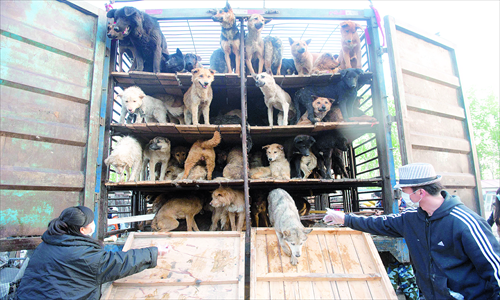Moved and suspended
The annual convening of the "two sessions" can be a frenetic two weeks of lobbying, persuading and ultimately disappointment for some deputies and delegates who bring important issues to the floor.
The National People's Congress (NPC) and the Chinese People's Political Consultative Conference (CPPCC) will see all sorts of suggestions and proposed bills brought forward by individual deputies and delegations from provinces, municipalities and regions.
While the 10-day sessions are full of meetings, debate and discussion, some deputies' independent efforts at promoting "causes" are akin to pushing a boulder uphill. They need to persuade staunchly conservative deputies to take a stand. They also need to lobby powerful delegations to get their issue on the agenda.
Deputies to the NPC can move motions for new laws to the congress's central committee and make proposals for new regulations to the responsible government departments. CPPCC members can make proposals for new regulations but they have no power to legislate.
At the 2011 two sessions, deputies to the NPC moved 566 motions and put forward 8,043 proposals, according to the NPC spokesperson Li Zhaoxing, adding that 77 percent of the proposals have either been dealt with or are in the process of being resolved.
Many delegates with independent motions and proposals in their pocket know it will take time, and although some have spent years pushing, few say they'll stop.
Financial disclosure of officials
Since 2006, NPC deputy Han Deyun, a Chongqing-based lawyer, has proposed that the government initiate a system that would require government officials to disclose their assets, and show how they earned them. Such legislation, they say, may be an effective way to curb corruption.
Han wasn't the first to propose the disclosure legislation. Wang Quanjie, a professor at Yantai University in Shandong Province and NPC deputy, proposed it in 2005 and twice more in subsequent years.
Since 2007 Party cadres have been required to report to the Party their properties, cash, stocks, real estate and other assets, including those of their parents, spouses and children. Chinese government officials generally are not obligated to publicly disclose their financial holdings, except in a few cities that have initiated such a system on a trial basis.
The response to Han and Wang's motions appears to be evolving over the past years.
In 2006 Han's motion was declined because "conditions were not ripe." In 2007, he was told his motion contained difficulties, but they were not specified.
In 2008, the Ministry of Supervision called Han to assure him they were actively working on the issue.
Last year the Central Commission for Discipline Inspection, of the Communist Party of China Central Committee, responded saying a draft was in the works, said Han. "I believe this reflects a change in people's mind-set," said Han. "At first people didn't really know what it's about, because we haven't had such a tradition."
Now both the Ministry of Supervision, and the Central Commission for Discipline Inspection have a better understanding of the necessity of dealing with corruption, which continues to outrage the public, said Han.
Wang, however, is not as optimistic. "Corruption is so prevalent and severe that it would be very difficult to establish such a system" of asset reporting, said Wang.
Both Wang and Han agree that it won't be easy to design such regulations as there are many people who have a stake in keeping the status quo.
Wang suggests the government show leniency by providing a kind of amnesty for past sinners. "For example, we could ask officials to return the illegitimate income to a bank account within a certain period of time, and if they do they won't be charged with corruption," he said.
Wang also suggested that the requirement for full disclosure start by including only newly-appointed, less entrenched officials.
The public's understanding of such disclosure requirements is another hurdle, said Han.
"People tend to think clean officials live in poverty, with 'empty sleeves.' They might not accept that officials have a right to legitimately earned income," said Han.
The task right now is to reach a consensus on whether officials should be required to publicly disclose their financial status, and move the legislation along and establish such a system, said Han.
Family planning policy
This year will be the fifth time Ji Baocheng has proposed that the government relax the family planning policy. The former president of Renmin University of China and a deputy from Beijing said it's time that China allows all people to have more than one child.
He said that every year the reply is the same, "We'll look into it further."
Over the years adjustments to the policy have allowed some couples to have a second child. Rural families are now allowed a second child if their firstborn is a girl, and couples who were both raised as single children can have two children.
"The Party said in 1980 that in 30 years we will have solved the population problem and the policy would be changed. It's now 31 years later!" said Ji.
Many experts have raised serious demographic issues facing the country that are at least in part the fault of the family planning policy. The needs of an ageing population and a pending labor shortage are both becoming serious concerns.
In 2007, 29 CPPCC members also submitted a proposal asking that the policy be abolished.
Those who object to allowing people to have large families worry that the population growth will again spiral out of control.
Demographers, however, point to trends that show it's highly unlikely many couples will want to have many babies, said Ji.

Animal protection law
Since the founding of the China Small Animal Protection Association in 1992, many NPC deputies and CPPCC delegates have urged the country to pass laws to curb animal abuse, and protect their welfare. China has promulgated laws to protect wildlife but not one that protects dogs or other domesticated animals.
Many people are upset there are no laws that can prevent animal abuse and a rising tide of such stories has caused widespread controversy and disgust. Over the last two years, a video of a woman killing a rabbit by stomping on it with her high heels caused outrage on the Internet and a truck load of dogs being transported to restaurants was rescued by activists on a highway outside Beijing. More recently a company that farms bears to extract their bile was accused of inhumane treatment of the animals. Its plan to list on the stock market was widely criticized.
In 2006 and 2007, NPC deputy Zhou Ping, a hot line operator from Chengdu, called for an animal welfare law and the elimination of bear farming.
"The related department replied saying they would look into it. It was the usual bureaucratic wording," recalled Zhou.
He Yue, a lawyer and law professor from Tianjin, has also twice suggested that the country pass a law to protect small animals. She also didn't get a satisfactory reply from the authorities.
"Perhaps the government has too much on its agenda to make this legislation a priority," said He. "Another reason is there are so many government departments involved in legislations like this and it's not always clear which should take the lead."
The traditional relationship between humans and animals is still an obstacle to passing such a law, said Zhang Dan, founder of the China Animal Protection Media Saloon. Chinese people generally don't treat animals with respect and kindness, she said, adding that attitudes are improving in favor of animals.
"Many people still argue that issues relating to human development haven't yet been taken care of and that they should be the priority," said Zhang.
An animal protection law is needed not only to end animal cruelty, it's also important in terms of food safety and the export of Chinese products, said He Yue, adding that treating animals with respect also raises the respectability of humans.

Same-sex marriage
Legalizing same-sex marriage has become one of the most widely reported issues that get nowhere on the agenda of the two sessions. Suggestions to allow people of the same sex to marry have only been formally submitted at the NPC and CPPCC meetings a couple of times.
"It's difficult to find deputies or members who are willing to do that," said sociologist Li Yinhe, who has been pushing the cause since 2001.
"Either the deputies or members fundamentally reject the idea of same-sex marriage, believing that homosexuality is an illness, or they say it's not their area of expertise and therefore it's inappropriate for them to attach their names to the issue."
Submitting a motion at the NPC sessions requires the backing of a provincial delegation or at least the support of 30 deputies who are willing to co-sign a proposed bill.
This year a lawyer had initially agreed to pass along this motion but backed down when her delegation wouldn't agree. Another female CPPCC member also said she would propose a same-sex marriage law but changed her mind at the last minute.
Some deputies and delegates did call for legalizing same-sex marriage or union in the form of a suggestion, (which doesn't require co-signatories) but they didn't want to be named, said Li.
In 2006 Wu Jianmin, spokesperson for the NPC session at the time, said at a press conference that legalizing same-sex marriages was too ahead of its time for China.
Despite improving awareness and tolerance, many people still hold the strongly held traditional views about gay marriage, said Li.
"Another problem is we lack a channel for the minority groups, such as the gay community, to be effectively heard by authorities, and thereby protect their rights and interests," she said.
"I know it's a long shot, but still we have to make the effort now," said Li. "It's going to be a long wait."
